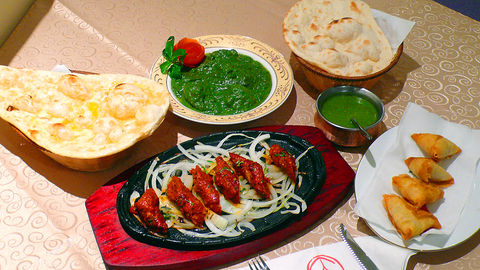One of Taipei's oldest and most reputed Indian restaurants, Tandoor Indian Restaurant, has recently found a new home in the multicultural Tienmu neighborhood serving the same authentic North Indian cuisine and an enchanting interior design mixing elegance with modern chic.
Named after the traditional Indian clay oven, Tandoor takes its native recipes seriously and imports all the spices and herbs from India. For each dish, at least 10 to 12 spices are used.
"Many people ask us if we make changes to appeal to local palates. I always reply that there is no such need since the menu is so extensive, diners are bound to find something to their liking," said manager Monisha Relwani.

PHOTO: HO YI, TAIPEI TIMES
Relwani's confidence is not unfounded since the restaurants experienced Indian chefs study the ancient combinations of spices and are skilled at making over 100 different sauces.
For appetizers, the barbecued delicacies come highly recommended as they are roasted in the tandoor in the traditional way. Seekh kabab (NT$290), or the roasted minced mutton, is one of the most-ordered dishes.
The Indian gravies come in three basic kinds: yellow, which is made of various vegetables and ginger powder; red, which is either tomato or chili-based; and green, which is the spinach-based. The vindaloo is not for the faint-hearted. If you prefer something milder, chicken saagwalla (NT$300) has a slight tang of spices mixed with the fresh flavor of spinach.
Arguably the world's favorite Indian dish, chicken tikka masala (NT$350), cooked with green peppers, onions and spices, is perfect with a basket of garlic naan (NT$70), according to Relwani.
"All our meats are deboned and skinned since North Indian cuisine was traditionally served at the imperial family's dinning table and the royal family liked their food immaculately prepared," the manager explained.
As for the vegetable options, aloo gobi (NT$220), or cauliflower and potatoes cooked with dry herbs and spices and chana masala (NT$220), which is chickpeas cooked in traditional Punjabi style with a thick spicy gravy, are two must-tries for vegetarians.
A tip to Tandoor's customers: ask for a doggie bag for leftovers since the sauces are the soul of the food and excellent seasonings for bread, rice or noodles.

Most heroes are remembered for the battles they fought. Taiwan’s Black Bat Squadron is remembered for flying into Chinese airspace 838 times between 1953 and 1967, and for the 148 men whose sacrifice bought the intelligence that kept Taiwan secure. Two-thirds of the squadron died carrying out missions most people wouldn’t learn about for another 40 years. The squadron lost 15 aircraft and 148 crew members over those 14 years, making it the deadliest unit in Taiwan’s military history by casualty rate. They flew at night, often at low altitudes, straight into some of the most heavily defended airspace in Asia.

Beijing’s ironic, abusive tantrums aimed at Japan since Japanese Prime Minister Sanae Takaichi publicly stated that a Taiwan contingency would be an existential crisis for Japan, have revealed for all the world to see that the People’s Republic of China (PRC) lusts after Okinawa. We all owe Takaichi a debt of thanks for getting the PRC to make that public. The PRC and its netizens, taking their cue from the Chinese Communist Party (CCP), are presenting Okinawa by mirroring the claims about Taiwan. Official PRC propaganda organs began to wax lyrical about Okinawa’s “unsettled status” beginning last month. A Global

Taiwan’s democracy is at risk. Be very alarmed. This is not a drill. The current constitutional crisis progressed slowly, then suddenly. Political tensions, partisan hostility and emotions are all running high right when cool heads and calm negotiation are most needed. Oxford defines brinkmanship as: “The art or practice of pursuing a dangerous policy to the limits of safety before stopping, especially in politics.” It says the term comes from a quote from a 1956 Cold War interview with then-American Secretary of State John Foster Dulles, when he said: ‘The ability to get to the verge without getting into the war is

Like much in the world today, theater has experienced major disruptions over the six years since COVID-19. The pandemic, the war in Ukraine and social media have created a new normal of geopolitical and information uncertainty, and the performing arts are not immune to these effects. “Ten years ago people wanted to come to the theater to engage with important issues, but now the Internet allows them to engage with those issues powerfully and immediately,” said Faith Tan, programming director of the Esplanade in Singapore, speaking last week in Japan. “One reaction to unpredictability has been a renewed emphasis on